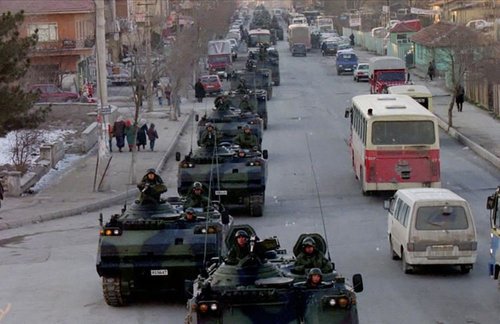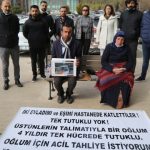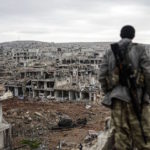Turkey’s 54th government was formed on June 28, 1996, by the Islamist Welfare Party (RP), which got the highest share of votes, and the center-right True Path Party (DYP).
A year before, Recep Tayyip Erdoğan, who was a member of the RP at the time, was elected the mayor of İstanbul by a slight margin.
The RP’s Islamist agenda and discourse caused concern in the army, which had a significant influence on politics at the time.
What led to the pressure by the army the most was a Ramadan iftar dinner on January 11, 1997, at the Prime Minister’s Residence, where RP leader and PM Necmettin Erbakan hosted leaders of religious communities across Turkey.
Erbakan with religious group leaders
The military expressed its dissatisfaction on February 4 by holding a “military parade”, which included tanks, in the streets of Ankara’s Sincan district.
Following the parade, then-Deputy Chief of General Staff Çevik Bir said the event had been intended to “balance democracy”.
Mayor of Sincan, Bekir Yıldız, an RP member, meanwhile, was dismissed from his post and arrested after being accused of “inciting” the public.
Then-Deputy Prime Minister and DYP Chair Tansu Çiller, conveyed her “concerns” to the prime minister, causing rifts to deepen between the coalition partners.
The NSC meeting on February 28
On February 28, Turkey’s National Security Council (NSC) held an emergency meeting that lasted almost nine hours, the longest-ever single session in the NSC’s history.
On February 28, 1997, the National Security Council, which consists of senior military and government officials, released an 18-article declaration against what it called “reactionary activities against the secular state” in an ultimatum to the coalition government of the time.
On June 18, RP leader Necmettin Erbakan resigned as the prime minister in accordance with a protocol with his coalition partner, DYP Chair Tansu Çiller. The two leaders had agreed on alternating the prime ministry between themselves until the elections.
However, then-President Süleyman Demirel assigned Mesut Yılmaz, the chair of the Homeland Party (ANAP), instead of Çiller, to form the government.
A new civilian government formed by three parties —the ANAP, the Democratic Left Party (DSP), and the Nationalist Movement Party (MHP)— succeeded the RP-DYP coalition in a move that became known as the “postmodern coup.”
In January 1998, the RP was shut down by the Constitutional Court due to “activities violating the principle of the secular state.”
Erdoğan after the demise of RP
In March 1999, then-İstanbul Mayor Erdoğan was imprisoned for “inciting the public into hatred and animosity” because of reciting a poem, which included the line, “Mosques are our barracks, minarets [a tower adjacent to a mosque] are our bayonets,” at a rally in Siirt province in late 1997.
He was sentenced to 10 months in prison and was released after serving four months and 10 days. He also lost his post as mayor of Istanbul.
In 2001, Erdoğan left the Virtue Party (FP), the successor of the RP, to found the Justice and Development Party (AKP), which has been in power since 2002.
On February 28 last year, the president said in a speech, “I was the mayor of Istanbul during the February 28 era. I was thrown into jail for reading a poem, and my political career was targeted.
“I am now serving as the first democratically elected president of Turkey. I am serving my nation with pride, despite every move to hinder. A coup is a crime against humanity. I lived through the February 28 coup. I am aware of February 28.”
The trial
An investigation into the 1997 events was opened in 2012. Some 103 people stood trial for “involvement in the forcible overthrow of the Government of the Republic of Turkey.”
In April 2018, twenty-one defendants were sentenced to life imprisonment and 68 were acquitted. Charges were dropped against 10 defendants due to the statute of limitations and four defendants because they died.
Having examined the request of appeal, the Court of Cassation upheld the verdict on July 9.
In its ruling, the top appeals court described the events as “making the elected government dysfunctional” by imposing the NSC decisions on it with the support of media outlets, universities, unions, capital groups, civilian bureaucracy and judicial bureaucracy. (VK)
Source:Bianet
***Show us some LOVE by sharing it!***



